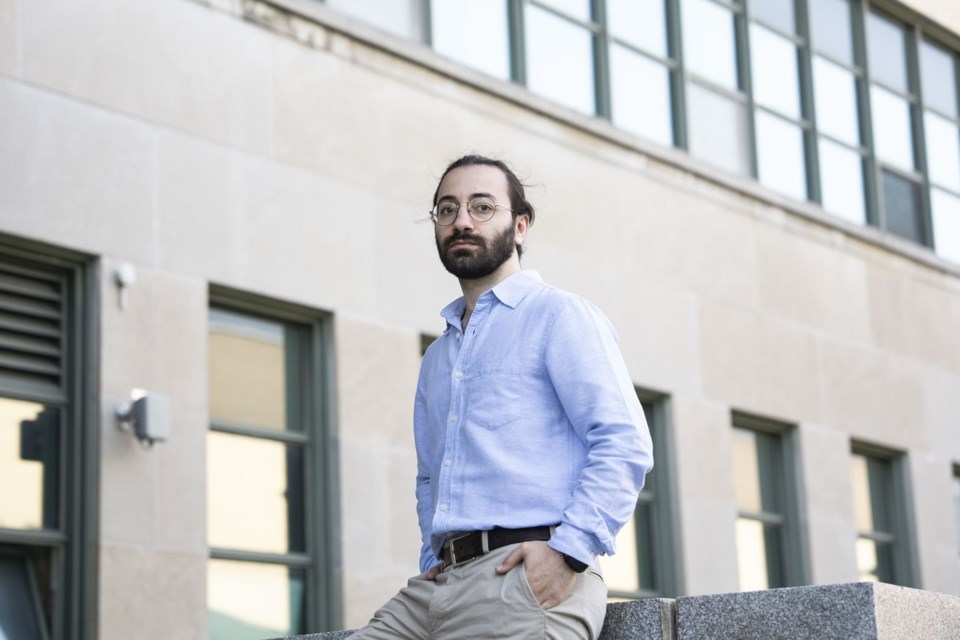MONTREAL — When Jad Albasha arrived in Quebec in 2016 as a 21-year-old fleeing his war-torn home of Syria, he landed in a snow-covered world that spoke French, a language in which he did not understand a single word.
But now it rolls off the tongue as if Albasha has lived here all of his life.
When he graduates on Saturday with a master's degree in civil engineering from Polytechnique Montréal, it will mark yet another milestone that shows how far he's come.
He went from being a third-year civil engineering student in Syria, just six months away from earning a degree, to wondering if he would be stuck working at a grocery store in Laval, north of Montreal, forever.
"The road is long. I sometimes wondered 'am I going to get there?' " Albasha said in an interview. "Nine years later, we see that it's possible to take steps."
Albasha decided he would immerse himself in French upon arrival. First with a francization course to learn the basics starting in March 2016 and lasting about nine months. The goal was to speak French with the least amount of errors.
Then, Albasha enrolled in a junior college program that would allow him to eventually resume his university career.
However, his transcripts and missing paperwork from Syria led him to be rejected by almost every local university due to incomplete applications. With the exception of one: Polytechnique Montréal.
The engineering school, which is affiliated with the Université de Montréal, has a large cohort of international students. Nine years later, his French is fluent. Enough so that he's able to work as a teaching assistant at Polytechnique.
"Merci, Bonjour, Bonsoir," that was the limit of his French in January 2016, Albasha recalled in an interview.
"I remember before I started my French courses I was working at a grocery store and I wasn't even a cashier, I was a bag boy because I couldn't speak to clients," Albasha said.
"It was difficult, every time someone asked me a question in French, I'd have to ask a colleague."
In January 2013, bombings at the Aleppo University killed 78 people and convinced the family it was time to leave the only home they'd known.
His family — including a twin brother, an older brother and his parents, spent some time briefly in Lebanon before Justin Trudeau's Liberal government expedited Syrian refugee claims allowing them to come to Canada over a period of a few months.
Even today, Montreal snow reminds him of his arrival to the country. He associates the fresh flakes with a renewal of sorts.
"It's a symbol of happiness for me, a new chance, a new start," Albasha said.
He works at AtkinsRéalis Group Inc., where he specializes in hydroelectric dams, a priority for Quebec's economic future, according to the current provincial government.
He doesn't see his family returning to Aleppo. All of his friends have either spread across the globe or have died in the war. Montreal is where the family's foundation has been laid.
Polytechnique Montreal's president Maud Cohen said Albasha demonstrates an important need for Quebec to bring in more engineers amid an aging population and a demographic deficit.
"The engineers really are building Quebec, they're responsible for innovation, creativity, everything that's happening in tech, in high-tech," Cohen said.
"So might as well bring in students like this that have been trained somewhere else that have the potential of bringing a contribution to the economy faster, that have the potential to be trained here.
"We need more people like Jad ... and it's not to diminish the role of people that are already living here."
Last December, Quebec adopted a law that put a cap on international student applications, with the ultimate aim of reducing overall immigration.
At a time when international students are facing a ban brought by the U.S. government and Canadian institutions look to capitalize on a brain drain due to funding cuts in the U.S., Cohen has a message for the government: "Help us help you."
"We recruit high-level students so how can we work together to make sure that we help you provide what the economy needs and to help us in the same way with either funding, or help us (by having) higher quotas to recruit."
Albasha is a mentor for others. He's the resource for many attempting to start anew.
"Sadly, I didn't have a chance to meet someone who'd lived through the same things as me, so I didn't have that example," he said.
But everyone deserves a chance regardless of where they come from. While recently presenting a paper in Winnipeg, Albasha went to the Canadian Museum for Human Rights. Inscribed on the wall was a quote: "All human beings are born free and equal in dignity and rights.”
"I found this to be profound and true," he said. "Sometimes we're not lucky, but we can't forget that if we persevere, we can get there in most cases."
This report by The Canadian Press was first published June 7, 2025.
Sidhartha Banerjee, The Canadian Press



